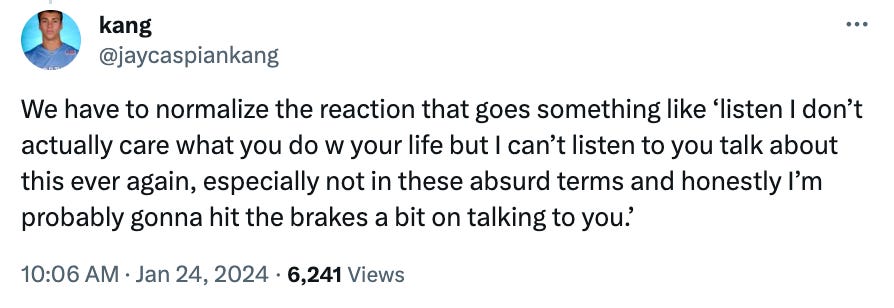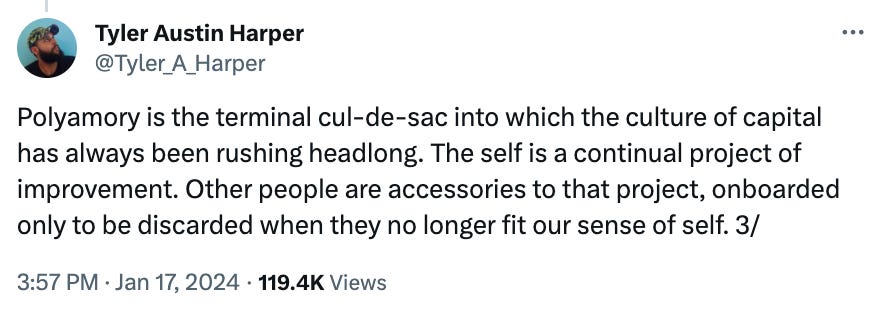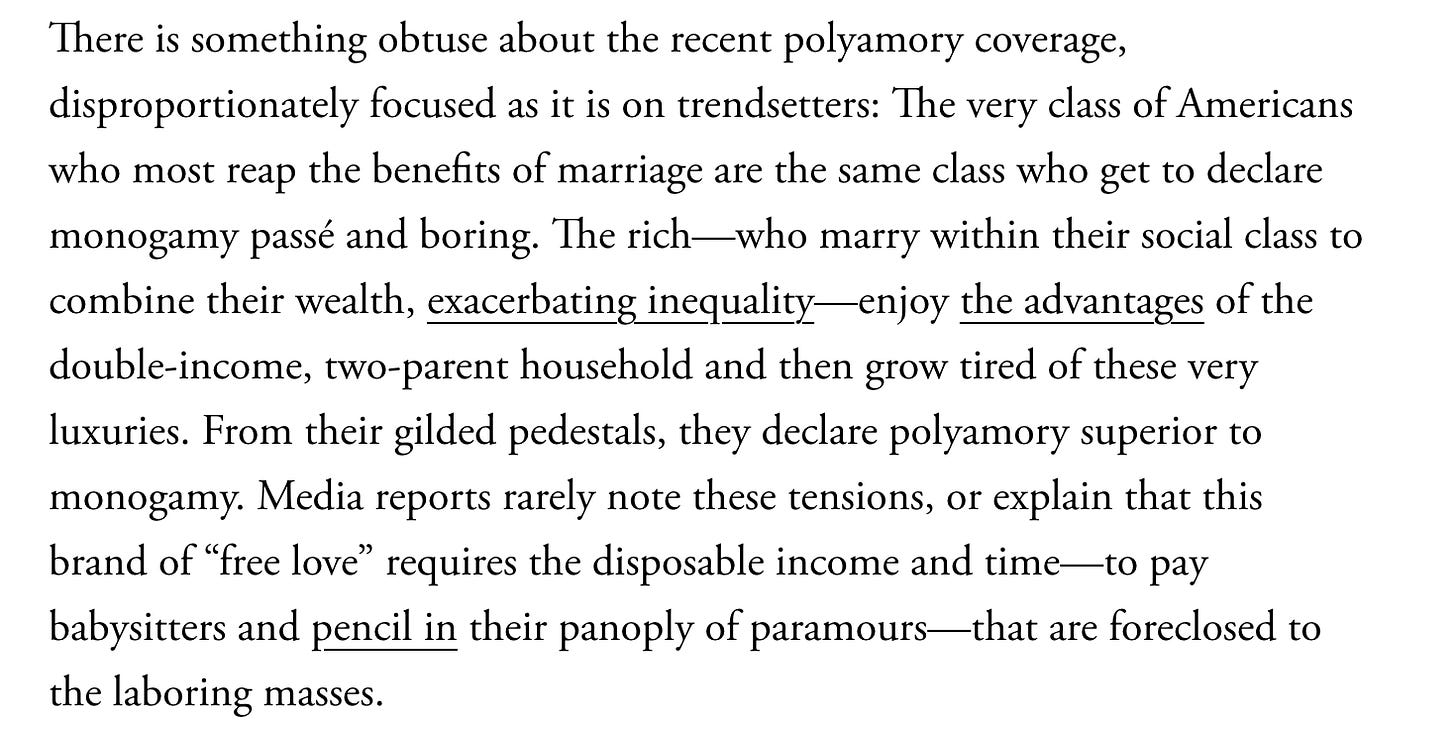It's okay to be normal
and other lessons from the poly discourse
1.
Not too long ago I spent some time interviewing a bunch of couples for New York’s cover piece A Practical Guide to Polyamory. Here is that cover.
It was a group effort: I did some of the interviews but none of the writing or editing. If I had, it might have looked different and probably would have done much worse. So, when the piece came out, I decided to the let the discourse pass me by. Not my circus, not my monkeys, as they say. I was content! I was serene! But nothing lasts.
2.
Here’s an old recycled joke tweeted by once-celebrated comedian John Cleese.
Thank you, John !
3.
It’s not a funny joke, but you’ve heard it before. It’s really old! In fact it never really seems to go away. It’s too useful, too modular. It’s our culture’s plug-and-play line of mere reaction. “Vegan” can be swapped out with whatever new thing has come around the corner. For a moment there it was “CrossFit”.
The joke survives because it captures the ethos of cultural backlash, condensing it to a single exchange. That ethos declares: I don’t care what you do in the privacy of your own home, just don’t rub it in my face!!!
4.
I was provoked out of my serenity by this tweet from Jay Caspian Kang:
I like Jay and I don’t want to put the blame on him. Instead, let’s just call this tweet representative of the backlash. Spend some time in the comments section to see what I mean.
It’s a bit hard for me to see why we need to “normalize” a reaction that is already ubiquitous. Knee-jerk “keep it to yourself!” reaction isn’t going anywhere. It’s the same reaction we gave to every counter-cultural group in history.
But I don’t want to call it normal. This behaviour is ubiquitous, but I tend to think it’s… pretty weird. Some people are going to live differently to you; sometimes you’re gonna have to read about it. That’s what it means to live among humans. So take a deep breath. It’s okay to be chill. It’s okay to be normal.
Good luck out there 👍
5.
In interview after interview, the people I spoke to were terrified of the reactions they would receive if they ever spoke openly about their relationships.
They explicitly described the fear of stigma as their reason for not coming out. All but 1 of the 20+ people I spoke to asked to be pseudonymous. Nearly all remained, in total or in part, in the closet.
6.
The reason the vegan joke isn’t funny is that… it’s just not true? Any person who actually knows a vegan knows that they are more likely to feel sheepish and embarrassed: that they don’t like to make a fuss.
Here’s how you actually find out someone’s a vegan. You sit down to a meal with them and their dietary requirements naturally come up and then they work hard to make sure everyone else isn’t inconvenienced.
And then, despite all that delicate treading, their life is inevitably taken to be an implicit criticism of everyone else. There’s always some insecure bloke at the table who begins to bombard them with questions they’ve answered at a thousand dinners before, and suddenly half the night is spent talking about… veganism.
7.
I think it’s instructive that when vegans and non-monogamous couples do reveal their choices, they get the same reply: Well, *I* could never do that.
No one asked!
8.
Here’s a joke a poly person told me.
Q: How do you know a monogamous person could never! be non-monogamous?
A: They’ll tell you.
9.
Disclosing any “alternative lifestyle” provokes emotions of insufficiency, envy, or anxiety in listeners. We can feel reprimanded or judged or threatened. We scramble to self-justify, we become defensive. Our internal moral order is called into question; we rush to displace those bad feelings. And the easiest way to displace them is to blame the source. They are “gross” or “strange” or “preachy” or just “talking too much about it”.
I’m saying that all the handwringing about poly people, or vegans, or gays, or trans people, or whomever, exists for the sole purpose of offloading negative emotions. That’s what being cranky is about. Being cranky is a copying mechanism.
Increasingly it’s a profession, too.
10.
I hope that the historical (or not so-historical) parallels to homophobia are obvious. I believe they should be, and that the comparison is instructive. It is manifestly not a coincidence that non-monogamy, disproportionately practiced by queer people, is a site of backlash.
(Just as it was never a coincidence that veganism, disproportionately practised by women, is scorned).
11.
Technology has accelerated cultural change; cultural change has accelerated crankdom. There’s a pretty penny to be made on the side of crankdom. Career advisors, tell your cranky students: you can go pro! Your role in the discourse economy is to intellectualise, legitimate, and finally displace the feelings of anxiety that pluralism brings. You’re there to help people offload the shitty feelings caused by people choosing to live differently to them. People will pay well for that.
12.
I think one of the problems with professional crankdom is that trying to justify your base reactive emotions can make you sound really silly.
13.
Over and over again, the people I spoke to were desperate to emphasise that their choices were not for everyone, that they made none of these decisions lightly, that polyamory for them was a path to deeper commitment. Over and over again they insisted that they had made a personal choice that did not necessarily generalise—that there was nothing wrong with monogamy.
14.
The picture of non-monogamous people that Tyler Austin Harper appears to carry in his mind is so utterly divorced from the reality of the human beings I spoke to that I hesitate to draw attention to it. His piece, attacking polyamorous ‘elites’ in the pages of The Atlantic (I swear to God) left me totally adrift. My interviews had involved multiple school teachers!
‘The very class of Americans who most reap the benefits of marriage are the same class who get to declare monogamy passé and boring,’ writes Harper.
What! What class? When did they declare monogamy passé and boring? When? When? When?
What strikes me at every step along the way is Harper’s refusal to ground any claim in the text.
‘From their gilded pedestals,’ he writes, ‘they declare polyamory superior to monogamy.’
What! Is! He! Talking! About! Who? When? Why can he link to no examples of this? Are you just allowed to say stuff in The Atlantic (rhetorical)? Is this a vibes-based argument? Who are these elites? Who believes that people are ‘accessories to a project of self-improvement’? Where does this fever dream come from?
It seems to me that the mere existence of non-monogamous people has been taken as an implicit criticism of monogamous people. This man has sat down to dinner with a vegan and handled it badly.
15.
Harper seems to think that ENM people actually are like the vegans in the joke, and that they are so keen to spread the gospel that they have coordinated a massive media push.1
I think this is the type of fantasy you can only develop with the right distance, right grievance, and right incentives. To get there you have to forget that editors assign stories, not interview subjects. You have to ignore the possibility that those editors may be in marriages just as monogamous as your own. And you have be blind to the fact that their first incentive is not to make people poly, but to sell newspapers.
16.
I will be concrete. I take exception to a piece that, on the basis of no evidence and no reporting, attributes a cultural practice to “the ruling class” so as to smear people without touching the mud of research. I think if you’re going to run a piece called ‘Polyamory, the Ruling Class’s Latest Fad’ you are obliged to make some attempt, any attempt, to establish the relationship between those nouns.
I think shooting from the hip of gut impulse and insecurity and pure unfiltered id is not a good idea. Dressing it up as some heroic salvo shot towards ‘the ruling class’ is good enough to flatter the populist impulses of our broadly conservative politics.2 But it does nothing to hide the transparent playacting fantasy; the shadowboxing in the dark.
17.
How do two people end in such divergent places? One explanation, as Scott Alexander points out, is that Harper relies a great deal on the loudest and least attractive character in this saga: the woman who wrote the memoir that some of this stuff was pegged to. I straight up do not know her name or the name of the book: it seems boring! I try not to read boring books, and I rarely take them to represent anything.
A similar lesson came out in my exchange with Kang—he’d been activated by an interview I’d barely skimmed. I should say: Kang and Harper now host Time To Say Goodbye together. And in their defence, these examples were right at the top, as they say. They didn’t make them up, and the pieces were given pride of place by the publications. The media had given the most space to the most unflattering characters. The mistake of the Time To Say Goodbye guys was to take those portraits as representative. But that, of course, is what they are incentivised to do.
It’s hard to blame them. They didn’t get to interview people for hours. So they, like the people in the Instagram comments, just took the media representations at face value. But… they’re professionals. They should know better. There was no consideration that unflattering portraits are chosen deliberately, placed actively. This lack of nous concerns me most. They saw unlikable characters and reacted against them, never wondering if their reactions weren’t elicited on purpose. Shrewder, I think, is to assume the effect is deliberate.
18.
I think we’d all do well to take a step back and look at the ecosystem in which all this Sturm und Drang is produced. We could all say this more often, but rocking the boat rarely pays. Plus: everyone already knows it, even if we tend to forget.
So here goes. Your media are penguins jockeying for position on a melting ice cap. Your discourse is a semi-symbiotic resentment machine that harvests clicks and hate-clicks alike. Major publications often elicit, aim for, cranky responses in the comments section, or The Atlantic, or wherever. Content can be crafted with cultural reaction in mind. A memoir comes out; magazines peg a piece; a crank reacts on social media; an editor assigns the take over at crankreacts.com The Atlantic; a tired nobody writes a post on Substack. It’s all deliberate and symbiotic, everyone goes home dissatisfied, and the ice caps keep melting. None of this material needs to be smart or virtuous or, like, truth-directed. It’s all just culture war. For clicks.
I guess this is all a nefarious plan by Big Poly? To get the readers of The New York Times to fuck each other? By the capture of our media elite via the ENM Industrial Complex?
How far we vulgar marxists have fallen, peddling our battleworn terminology on the steps of The Atlantic in exchange for scraps of personal validation!







If only people took the time to sit down with people on the proverbial "other side" and realize that media is accurate ~0% of the time